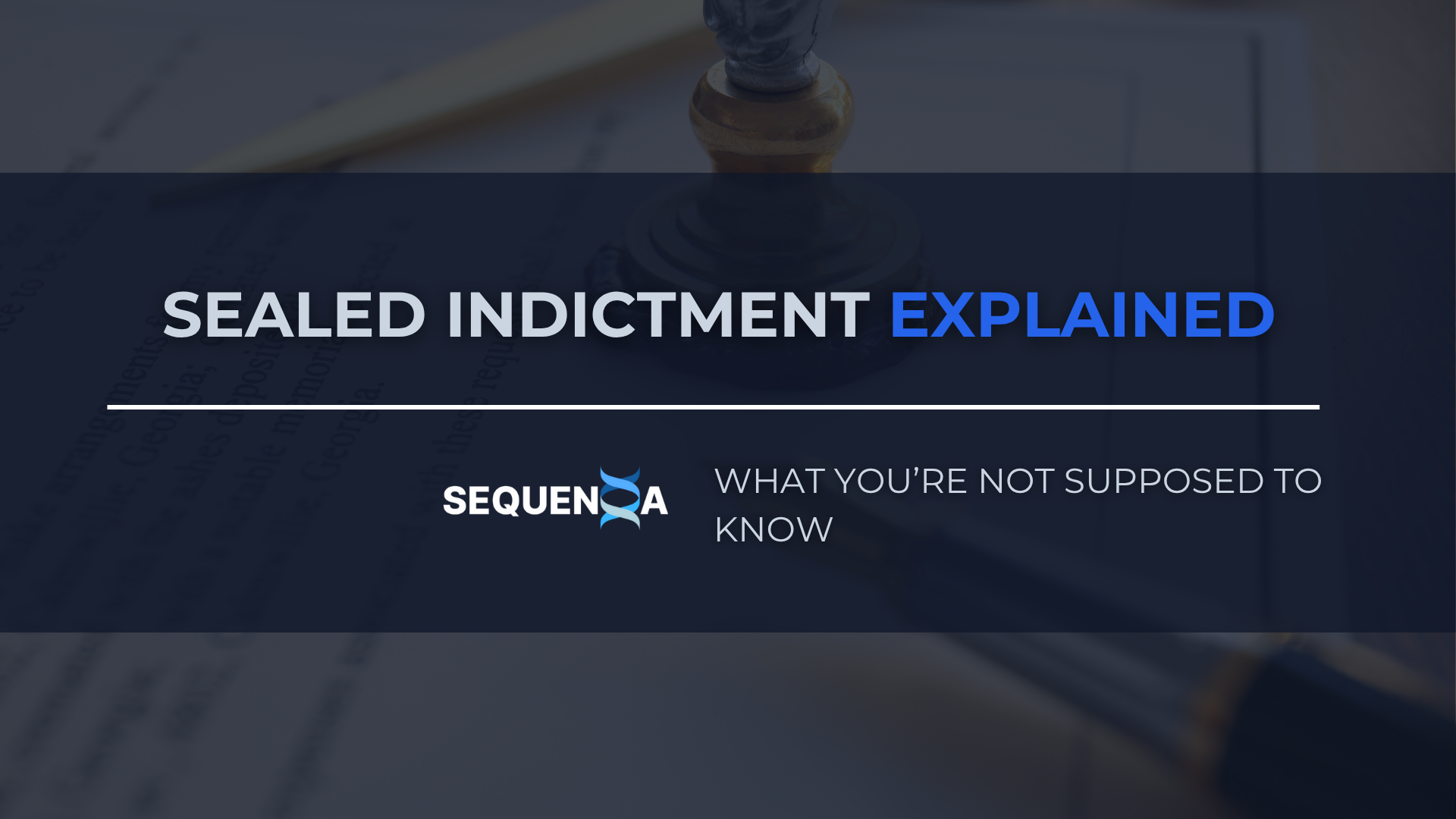Sealed Indictment Explained:What You’re Not Supposed to Know

A sealed indictment can derail lives and careers before anyone even sees it coming. These hidden legal actions are used in high-stakes criminal cases, from federal drug conspiracies to public corruption, and often signal that law enforcement is working behind the scenes.
This guide will clarify the sealed indictment meaning, answer why are indictments sealed, explore sealed indictments by state, and help you understand the legal strategy behind a sealed federal indictment. You’ll also learn how to find out if you have a sealed indictment, the differences between sealed and unsealed indictment meaning, and why secrecy matters so much.
Why Do Courts Use Sealed Indictments?
Sealed indictments aren’t used to confuse the public, they’re designed to protect the case and the people involved. But that secrecy can also create confusion, risk, and legal uncertainty.
3 Reasons for a Sealed Indictment
To Protect the Integrity of an Ongoing Investigation
Prosecutors often request sealed federal indictments to prevent suspects from fleeing, destroying evidence, or coordinating with others under investigation. If a suspect learns of charges before arrest, they could escape the country or disrupt the case. Keeping the indictment sealed ensures investigators can execute arrests or searches strategically and without interference.
To Shield Witnesses and Victims
When cases involve vulnerable individuals or cooperating informants, sealing the indictment helps avoid retaliation. The court may keep details confidential until protective measures are in place or until those people can be safely relocated or placed under protection.
To Delay Public Disclosure for Strategic Timing
In complex or multi-jurisdictional cases, prosecutors may want to keep indictments sealed until they can charge co-defendants or align with other state or federal agencies. This timing allows for synchronized arrests and stronger legal coordination.
Example: In 2023, a sealed indictment against a state legislator was kept hidden for four months to allow prosecutors to secure electronic communications from international servers.
Is your legal defense team prepared to respond to hidden charges? Learn how proactive legal monitoring can protect you from unseen indictments.
Understanding the True Meaning of a Sealed Indictment
The phrase sealed indictment meaning often confuses people. It’s not just about hidden paperwork, it has serious legal consequences.
An Indictment Filed But Hidden From Public Record
A sealed indictment is a formal criminal charge that remains confidential. The accused, their attorney, and the public are typically unaware that the charge even exists. Only a limited group of officials, prosecutors, grand jurors, and select law enforcement, know about the case.
Secrecy Doesn’t Mean Leniency
Just because an indictment is sealed doesn’t mean the charge is minor. In fact, many high-level crimes such as money laundering, racketeering, or federal conspiracy often begin with sealed federal indictments to secure tactical advantage.
Unsealed Indictment Meaning
Once law enforcement is ready, the indictment is unsealed, making the charges public. This typically happens upon the suspect's arrest or court appearance. Once unsealed, the case proceeds like any normal criminal prosecution.
“A sealed indictment is like a legal trapdoor, it doesn’t exist until it suddenly does.”
Should sealed criminal indictment procedures be standardized across all jurisdictions to ensure fairness?
What Is a Secret Indictment and How Does It Differ?
Though the terms are often used interchangeably, secret and sealed indictments may serve slightly different purposes depending on the court and the state.
Secret Indictments Aren’t Always Legally Sealed
A secret indictment usually refers to any indictment kept hidden from the public or the defendant. It may not be technically “sealed” but remains undisclosed to avoid alerting the accused.
Sealed Indictments Are Formally Restricted by Court Order
A sealed indictment is officially blocked from public access by a judge. This legal status affects everything from warrant execution to court scheduling.
Both Are About Strategic Legal Advantage
Whether termed sealed or secret, the goal is to strengthen law enforcement’s hand by limiting leaks and controlling information flow.
“The difference between a secret and a sealed indictment often depends on the courtroom, not the law.”
Want to uncover if you’ve been targeted by a sealed or secret indictment? Use advanced legal record tracking tools designed to catch red flags early.
Sealed Indictments by State: How Location Impacts Secrecy
Legal transparency differs drastically depending on jurisdiction. Sealed indictments by state can vary in access, procedure, and even definition.
Some States Limit Sealing Powers
States like Florida and Texas require judicial oversight for sealing, and may allow partial visibility for attorneys or third parties under certain conditions.
Federal Rules Dominate in Cross-State Investigations
Sealed federal indictments apply nationwide and override local access rules. Federal investigators can act across multiple jurisdictions while maintaining full secrecy.
Timing and Unsealing Policies Differ
Some states automatically unseal indictments upon arrest; others wait until arraignment or the filing of formal motions. These timelines can dramatically affect your legal defense options.
Did you know? Over 30% of sealed indictments remain unopened after one year, often due to suspect flight or evidence delays (DOJ Annual Report, 2022).
Should there be a national standard for when sealed indictments must be unsealed?
How to Find Out If You Have a Sealed Indictment
It’s not easy, but it’s not impossible either.
Hire a Defense Attorney With Federal Access
Skilled attorneys with experience in federal cases may receive informal notice or clues during pre-trial negotiations. They can also file sealed motion inquiries or coordinate with trusted law enforcement sources.
Monitor Grand Jury Activity in Relevant Jurisdictions
If you suspect you’re under investigation, watch for unusual grand jury activity, subpoenas, or sealed document filings. These signs often accompany sealed criminal indictment filings.
Use Public Record Surveillance Tools
Some legal tech services can detect updates to sealed dockets or sealed case filings, even without revealing details. This helps attorneys anticipate moves before formal disclosure.
“The sooner you detect the existence of a sealed indictment, the more time you have to build a defense.”
How should defense attorneys ethically handle suspicion of sealed charges without confirmation?
The Risks of Ignoring Sealed Criminal Indictments
Many defendants are caught off guard by charges they didn’t even know existed.
Unprepared Arrests Lead to Unfavorable Outcomes
Defendants unaware of a sealed indictment may be arrested without proper legal representation or bail planning, weakening their early-stage defense.
Asset Freezes and Warrants May Be Executed Simultaneously
Sealed indictments are often paired with asset seizures, search warrants, or immigration holds, compounding legal exposure.
Delay Reduces Negotiation Power
Once unsealed, prosecutors have the upper hand. Those who knew in advance can request pre-trial diversion or plea negotiations. Without time, leverage disappears.
Did you know? More than 50% of sealed federal indictments result in guilty pleas within 90 days of unsealing (Federal Sentencing Commission, 2023).
Need to protect your legal standing? Use our monitoring tools to stay ahead of sealed or unsealed indictments across jurisdictions.
Unsealed Doesn’t Mean Unimportant: The Legal Aftermath
Once the indictment is revealed, the process moves fast, and the stakes get higher.
Charges Are Made Public
Once an indictment is unsealed, it enters the public court record, officially notifying the defendant, their legal counsel, and relevant authorities. This public disclosure can impact employment, reputation, and future legal strategy. Legal representation becomes critical at this stage to respond swiftly and start building a defense aligned with the specific charges.
Court Dates Are Scheduled
After the unsealing, an arraignment hearing is typically scheduled within a few days. Defendants are expected to appear and enter a plea, failure to do so may result in a bench warrant or additional legal consequences. Knowing the timeline helps defendants secure counsel and avoid procedural setbacks.
Bail and Custody Determinations Begin
A judge evaluates the nature of the sealed indictment, criminal history, and flight risk to decide whether bail should be granted. If the defendant is aware in advance, they can gather favorable evidence, like community ties or employment history, to seek a reduced bail or release on own recognizance. This step often determines whether a person awaits trial in custody or at home.
“Once unsealed, every move is on the record. The earlier you prepare, the better your outcome.”
Did you know? Cases with pre-indictment legal strategy are 3x more likely to receive favorable plea terms (ABA Criminal Defense Report, 2023).
FAQs
What is a sealed indictment?
A sealed indictment is a criminal charge filed in court but kept confidential by order of the judge until law enforcement is ready to act.
Why are indictments sealed?
They protect investigations, prevent flight, and ensure evidence isn’t destroyed before arrest.
What is a secret indictment?
A secret indictment is one that remains undisclosed to the public and often the defendant, but may not be legally sealed by court order.
How to find out if you have a sealed indictment?
Hire a federal criminal defense attorney, monitor legal records, and use legal data platforms that track sealed court activity.
What does sealed indictment mean?
It means that the indictment exists legally but is hidden from public access, delaying your ability to respond or defend.
What is the unsealed indictment meaning?
An unsealed indictment becomes public, signaling that formal prosecution has begun.
Are sealed indictments common?
Yes, especially in federal courts dealing with organized crime, public corruption, or financial fraud.
Could You Be a Target and Not Know It?
The legal system isn’t always transparent, especially when strategic investigations are involved. A sealed indictment could be in place long before your name appears on a warrant. Knowing what sealed federal indictments are, how sealed indictments by state work, and how to respond can make the difference between a fast recovery and long-term damage.
Is your legal strategy proactive or reactive?
Sequenxa helps you stay ahead of sealed and secret indictments with powerful monitoring, research, and strategic legal tools. Learn more about our secure intelligence services.
References
U.S. Department of Justice. (2022). DOJ Annual Report. Retrieved from https://www.justice.gov
Federal Sentencing Commission. (2023). Trends in Indictment Outcomes. Retrieved from https://www.ussc.gov
American Bar Association. (2023). Criminal Defense Strategy Report. Retrieved from https://www.americanbar.org



